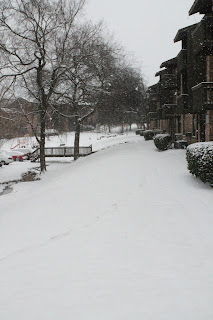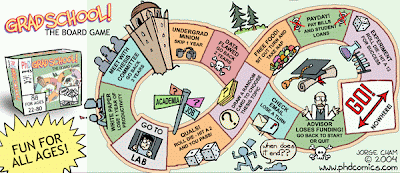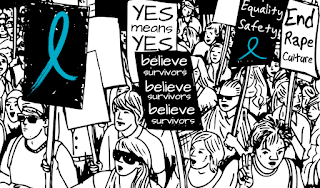Snow, Ice and Life
When I moved to Tennessee almost four months ago, there were many things I was worried about. In no particular order: confederate soldiers, snakes, tornadoes, chiggers, floods, snakes in the tornadoes -- you get the idea. No one warned me about the snow and ice though, which literally brings life to a complete stop here in Nashville. It was quite the experience for this California native. Don't get me wrong, I've spent a fair amount of time on weekend retreats in the Sierra Nevada's, I've gone snowshoeing through Tahoe and hit the slopes at Mountain High, but this was no vacation. This was real life...in slow motion.
The sidewalks and streets literally disappear, making it very difficult to do much of anything. Which gave me lots of time to contemplate what I think are some valuable life lessons.
1. Slow Down
Winter road conditions can be treacherous -- cars flip, cars slide, cars spin. To prevent this, drivers are encouraged to slow down. This translates to all aspects of being on the road including: pushing on the gas, or the brake, turning and merging, and traveling behind someone.
Sometimes in our lives, when things get a little snowed on and iced over, it's a reminder to slow ourselves down. Even things you've been doing comfortably for years, like driving, can be impacted. Slowing down isn't a question of your skills or ability. In fact, doing so actually enables you to call all your knowledge and experience into an intentional act that ensures you, and those driving alongside you, get to the destination safely.
2. Create Your Own Tracks
After it snows, you'll begin to see tire tracks creating a pathway in the road. It is tempting to set your car in the grooves and follow. Once the snow has been driven on though, it becomes compressed making it a slicker surface to drive on and increases the risk of sliding. It is actually encouraged to drive on fresh snow, even if you can't see the lanes clearly.
Sometimes in our lives, we need to be reminded that we don't have to follow the tracks created by those who have gone before us. There are times, even when it feels more uncertain, that we need to drive through the snow and make our own way.
2. Really, Slow Down
When snow and ice are on the ground, driving isn't the only thing that slows down. It begins to feel as though every task takes more time than usual. The added layers of clothing, defrosting your vehicle, walking the dog, heating the house -- everything just takes longer and feels slower.
Sometimes in our lives, it isn't always about how many things you can get done at once. There are moments that we need to slow down and be more intentional; to focus on details and be present in that task, relationship or project. In snow, we become more purposeful in our actions; it no longer is about getting as much done as possible, as much as it is about doing something well.
4. Trees are not Dead
During winter trees will lose all their leaves and enter into a state of dormancy. It's easy to look at their barren branches and think they are dead, but hey are still very much alive. The loss of leaves actually enables the tree to conserve energy. Scientists have discovered that trees that are allowed to weather the winters have a longer lifespan.
Sometimes in our lives, we lose our leaves and it feels an awful lot like death. We aren't producing anything, there is an inherent emptiness and nothing for the world to see. But our strength lies in the core of our being, the trunk if you will, and it will stand strong during the snow. Winter is a reminder to put energy into what is within, not just what being seen outside of us.
5. Use Salt
When snow and ice are imminent, salt is applied to roads and sidewalks. This magical (er, scientific) hydration process prevents these surfaces from icing over. That is, the application of salt actually melts the ice (or snow) creating salty water which dissolves the salt and lowers the freezing point below that pure or natural water. The salty water melts more ice (or snow) which in turn dissolves more salt, which continues to lower the overall freezing point. This is good, because ice on roads and sidewalks breaks cars and people.
Sometimes in our lives, we need help getting through the snow and ice. We often feel responsible for toughing it out or finding our own solutions as the winter begins to prevent us from navigating where to go. In those moments, it's okay to have a helper. It doesn't mean winter is over or that the help will solve everything. But at times, we need a catalyst who can help melt away the snow and ice which grants us access to move forward.
And most importantly, remember that Spring is coming. In a couple months the kids will be back on the playground, the flowers will be blossoming, and you will be able to use the new pair of sandals you just bought.
What has winter taught you?
What has winter taught you?









Comments